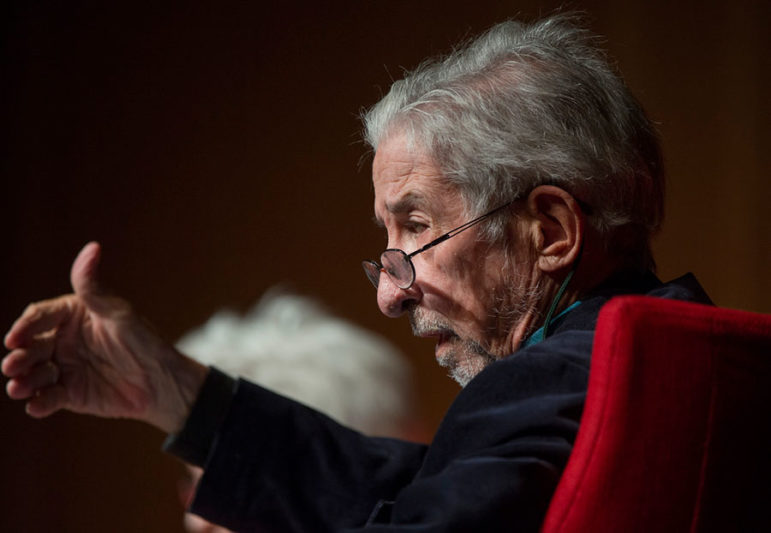
October 24, 2016; New York Times
It was in the DNA of his name to be a radical leader, to demand social justice and a public voice for all. Thomas Emmet Hayden IV, who was told he bore the name of radical exiled Irish nationalist Thomas Emmet, passed away Sunday at the age of 76. Hayden had a seat on one of the buses for the 1961 Civil Rights Freedom Riders. He was a founder of the Students for a Democratic Society (SDS), a participant in the Democratic Convention riot of 1968, a legislator in California for almost 20 years, the author of twenty books, and a college professor. The FBI had a file on him with over 22,000 pages. To say his life impacted the American story would be a woeful understatement.
Hayden’s wife, Barbara Williams, confirmed his passing, reporting that he had heart troubles and had become ill while attending the Democratic Convention.
He was born in Royal Oak, Michigan, in 1939 and was raised by his mother after his parents divorced. Hayden was editor of the school newspaper at Dondero High and, in true Hayden fashion, delivered a caustic opinion in his final editorial by using the first letter in each paragraph of the piece on patriotism to spell, “Go to hell.”
Hayden was a college student at University of Michigan at Ann Arbor during the Greensboro lunch counter sit-ins by black students and while the House Un-American Activities Committee searched for Communists in places like Hollywood. He met Dr. Martin Luther King in 1960 and took part in voter registration drives in the South.
Hayden was among the three dozen activists who formed the SDS in 1960. He became the editor of the college newspaper and managed to get a degree in sociology at the same time. Hayden was married to a social worker, Sandra Cason, in 1961, but they divorced after two years. In 1973 he married actress Jane Fonda after meeting her at a rally against the Vietnam War. They were married for thirteen years before their divorce in 1990. He married Williams in 1993.
Jailed in 1961 in Mississippi for the Freedom Riders’ protest against segregated public buses, Hayden spent that time writing the draft for the SDS platform, the Port Huron Statement. Its essence is still remembered; E.J. Dionne, NPR contributor and Washington Post columnist, tweeted Monday morning, “Tom Hayden RIP The main author of The Port Huron Statement, a powerful document in the history of American dissent:
Sign up for our free newsletters
Subscribe to NPQ's newsletters to have our top stories delivered directly to your inbox.
By signing up, you agree to our privacy policy and terms of use, and to receive messages from NPQ and our partners.
“We are people of this generation,” it began, “bred in at least modest comfort, housed now in universities, looking uncomfortably to the world we inherit.” It did not recommend specific programs but attacked the arms race, racial discrimination, bureaucracy and apathy in the face of poverty, and it called for “participatory democracy” and a society based on “fraternity,” “honesty” and “brotherhood.”
Committed to peace, Hayden made illegal trips to Vietnam during the ’60s, making contact with those in Hanoi who would assist him in the release of American prisoners of war. He was arrested with others for inciting to riot and conspiracy for the 1968 Democratic Convention demonstrations. He and the others, known as the Chicago Seven, were acquitted of conspiracy, but five of them were convicted of inciting riot, which was overturned.
Words Hayden wrote in 1967 reverberate today. In the late ’60s, after seeing rioting, the destruction of property, and the destruction of people, he wrote, in “Rebellion in Newark,” “Americans have to turn their attention from the law-breaking violence of the rioters to the original and greater violence of racism.”
Often controversial most of his life, whether because of message or method, Hayden was nonetheless among only a few others in this world who spend their whole life dedicated to equality for every human being.
Hayden served in the government of California for 18 years, as a legislator in 1982 to 1992 and then as state senator. He did not win in his attempts to be governor or mayor of Los Angeles. He went on to direct the Peace and Justice Resource Center, a project of the nonprofit Social and Environmental Entrepreneurs.
He once said, “A silent majority and government by the people is incompatible.” Hayden was never silent.—Marian Conway













